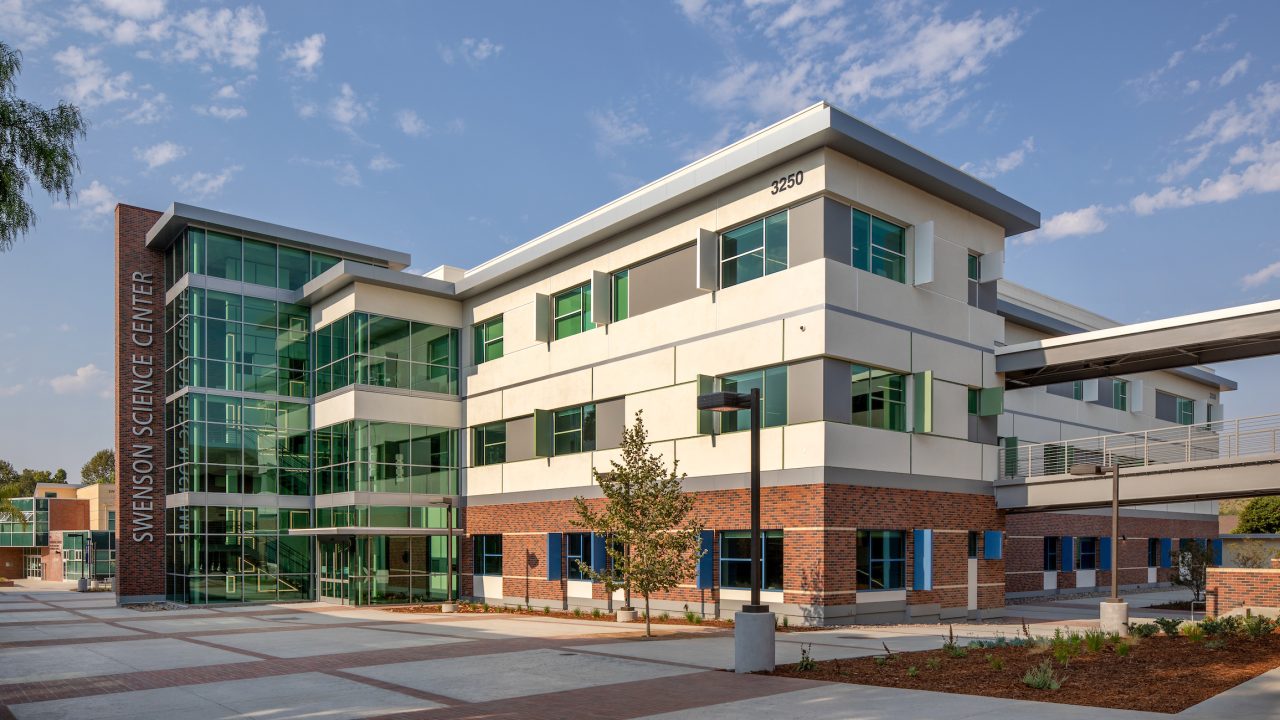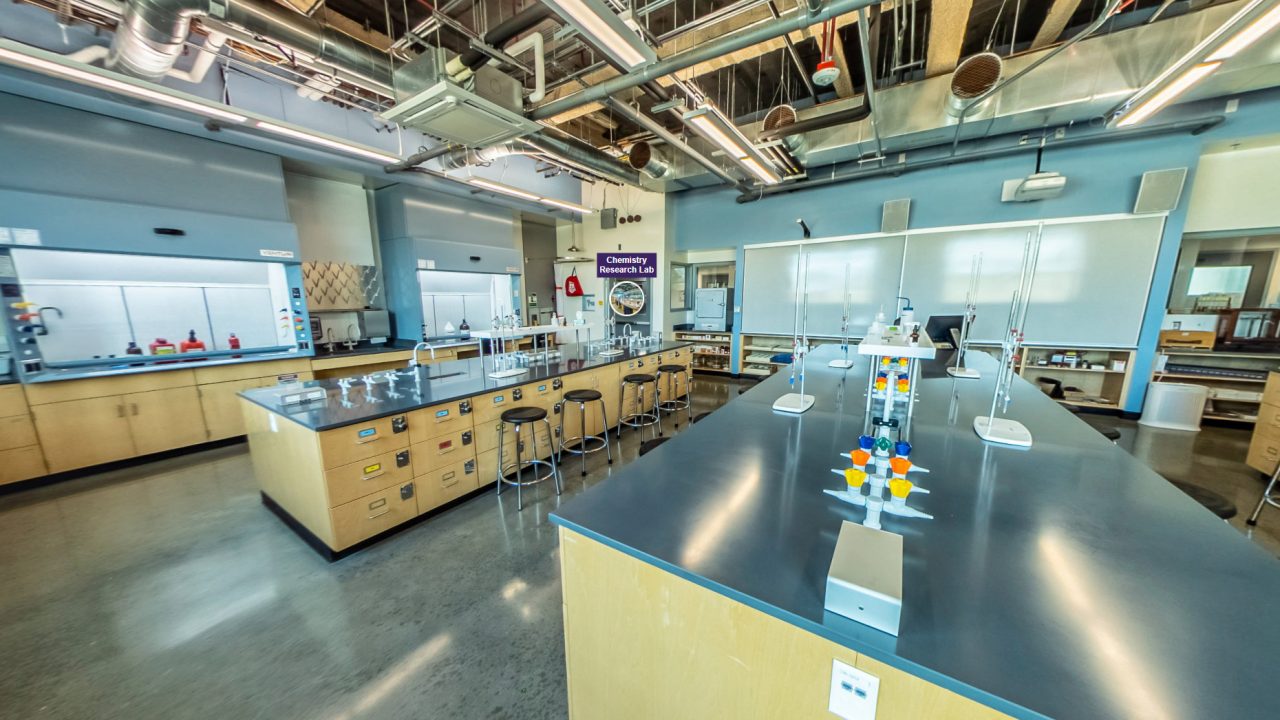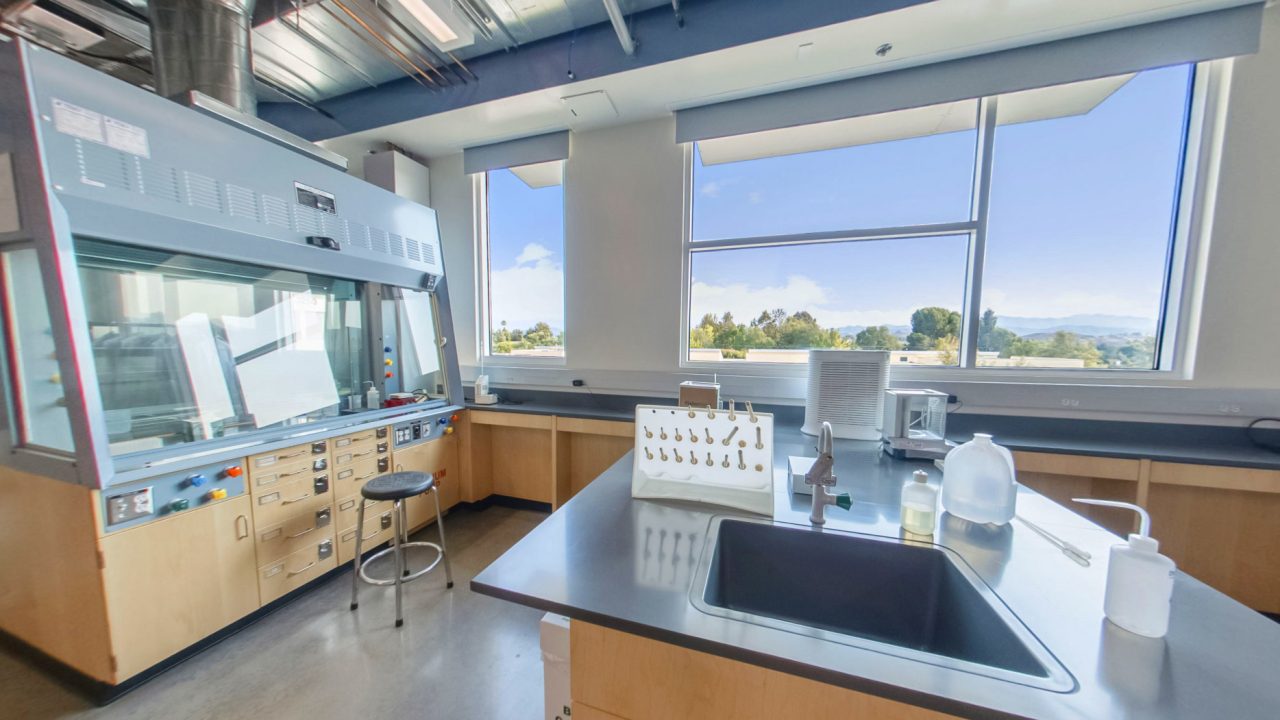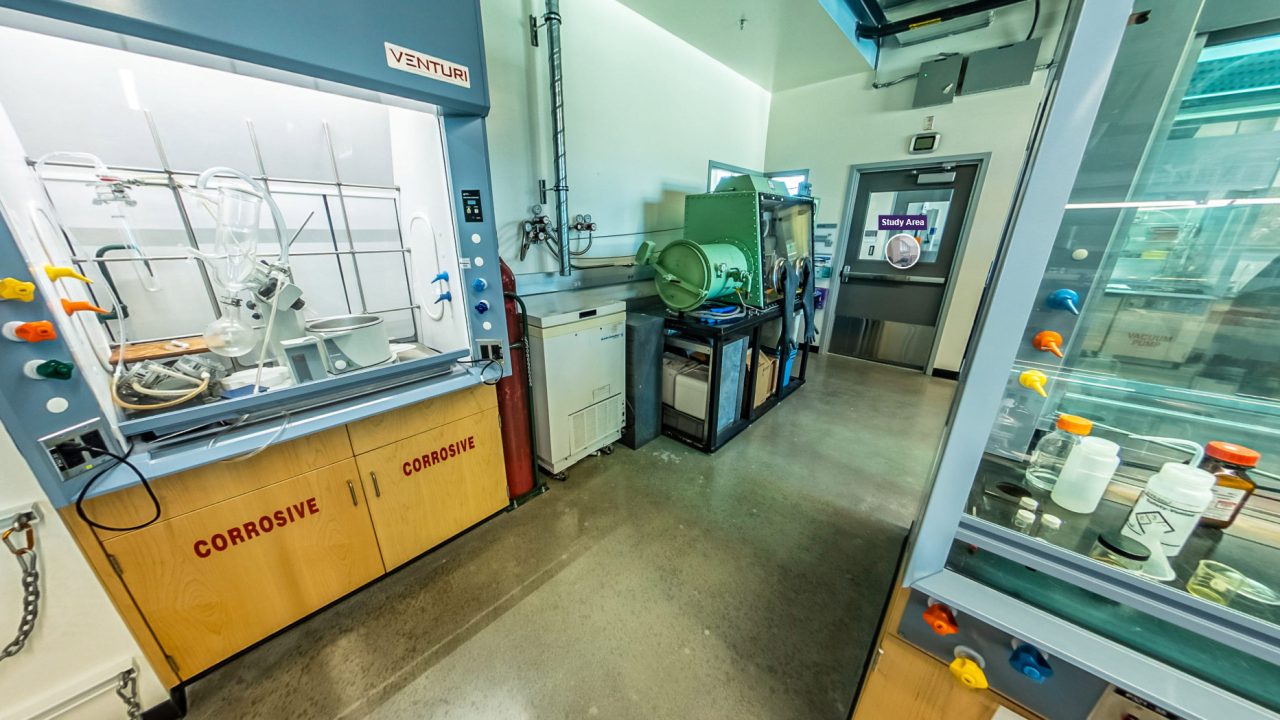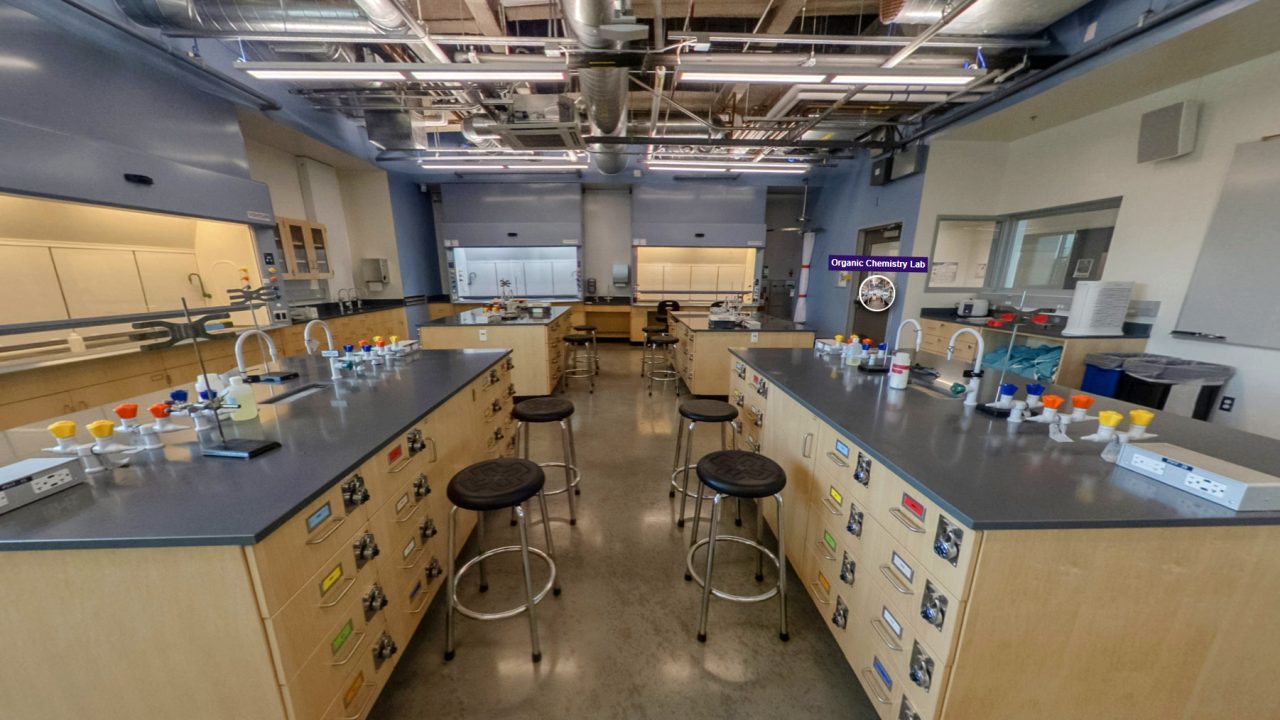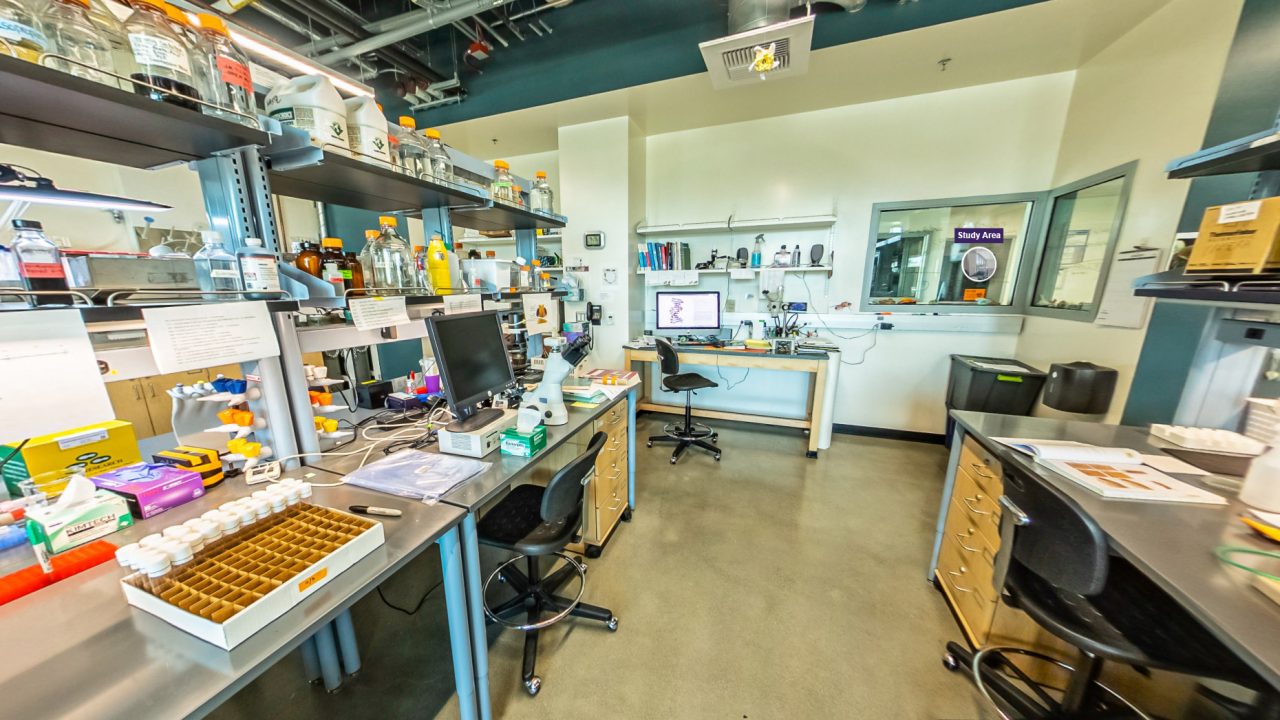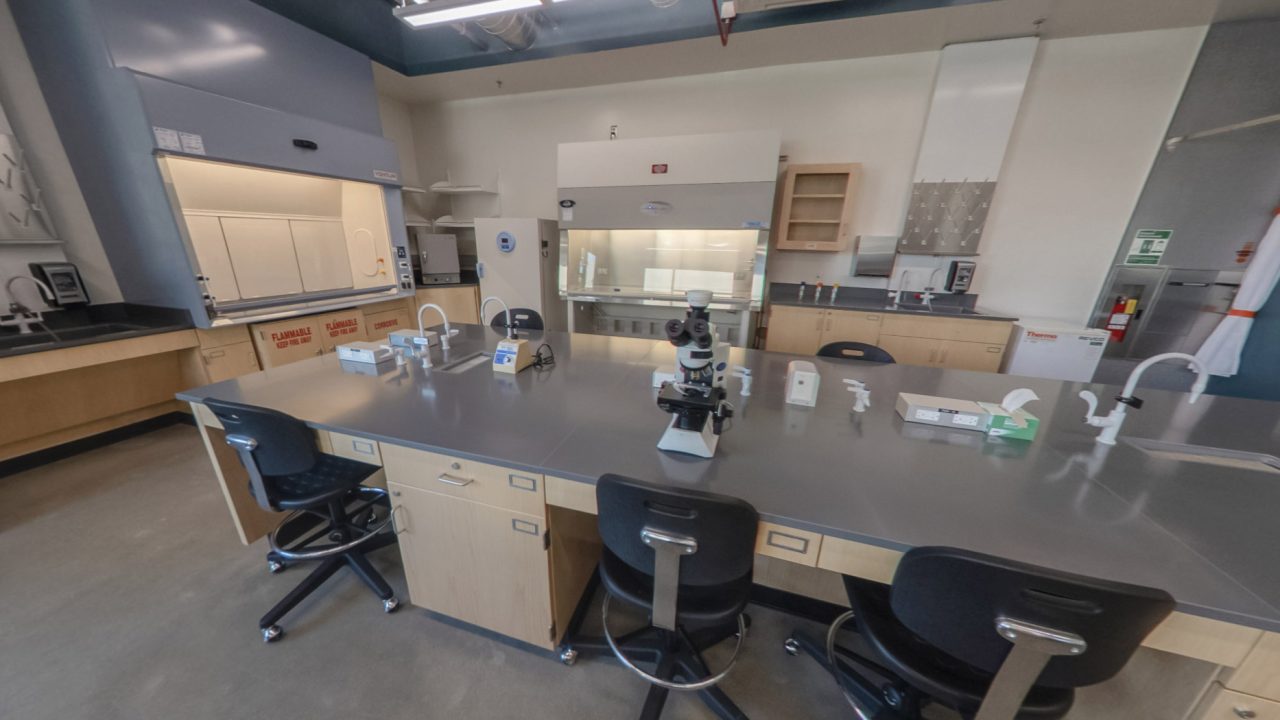Biochemistry and Molecular Biology
Biochemists and molecular biologists study the chemistry of life. This includes protein structure and function, metabolism, and the mechanics of DNA, RNA, and protein synthesis.
Our program serves students pursuing a bachelor of science or arts degree, as well as those seeking entry to medical or graduate school.
Gain employable lab experience
From the start of your program, you will have access to the key instruments and techniques commonly employed in biology and chemistry laboratories. You will also gain extensive experience in the use of recombinant DNA and genetic engineering technology to study gene structure and function.
Develop cutting-edge biotech skills
Our curriculum emphasizes techniques utilized in genomics and bioinformatics — two important focus areas that you will use as you design and carry out your own experiments.
During your first two years, you will focus on basic concepts and theories. Then, in your third and fourth years, you will apply these concepts and principles to the broader study of biotechnology.
Prepare for further studies
Pre-professional programs in medicine, dentistry, veterinary medicine, pharmacy and bioengineering can be pursued through the biochemistry program at Cal Lutheran. With biochemistry, you’ll get a solid foundation to launch your future in the health and natural sciences.
At a Glance
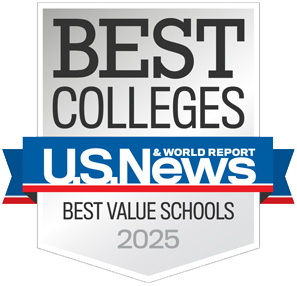
Degree Type
Bachelor of Arts
Bachelor of Science
Department
Biology / Chemistry Department
School/College
College of Arts and Sciences
Next Steps
Interested in this major? Here's what you can do next:
I’ve been wanting to do protein research since I took AP Biology. When I found out Dr. Hoffman had this wonderful lab where we’re looking at proteins in bacterial cells, I knew I had get into this lab because it was something I was so passionate about.
Samantha Ivañez
With challenging and relevant courses, outstanding faculty, small class sizes, and an emphasis on hands-on learning, the biochemistry and molecular biology program will position you to succeed in your chosen career.
Degree requirements
Find out what it takes to earn a degree in biochemistry and molecular biology and explore the courses.
Highlighted Courses
Get familiar with some of the courses you might take in this major.
BIOL 331: Genetics
This course concerns the mechanisms by which genetic information is stored, decoded and transmitted. We will focus on the experimental basis upon which our understanding of the above mechanisms rests. Methods of genetic analysis that involve interpretation of abstract data will be emphasized, although molecular and bioinformatic approaches, including structural and functional genomics, will be treated.
Read descriptionBIOL 332: Macromolecular Structure
The elaborate interplay of a variety of macromolecules underlies the mechanisms that govern cell function. This advanced course deals with the structure-function relationships of these macromolecular machines. It is intended that students emerge from this course with a deep understanding of the principles that govern macromolecular structure and the functional consequences of these principles.
Read descriptionBIOL 361: Microbiology
Studies the morphology, physiology, taxonomy and ecology of micro-organisms and their role in infection and disease.
Read descriptionBIOL 428: Virology
The study of prokaryotic and eukaryotic viruses. The structure and function of viruses, including their genomes, replication, and assembly are explored. Also covered are transmission of viruses, virus-host interactions, vaccines and antiviral drugs.
Read descriptionCHEM 405: Physical Chemistry
The study of kinetic theory, structure of condensed phases, thermodynamics, equilibria, electrochemistry, quantum chemistry and chemical kinetics.
Read descriptionCHEM 332: Organic Chemistry II
Covers the structure, nomenclature, reactions and synthesis of organic compounds, plus the theory and mechanism of organic reactions.
Read descriptionView all courses in Biology / Chemistry
Recommended Minors
Want to add even more value to your degree? Consider one of these minors to gain a unique combination of skills and perspectives.
Check out the spaces and tools you'll have access to in this major. Explore the entire Cal Lutheran campus with our virtual tour
We offer hands-on opportunities that give you the freedom to explore your passion through real-world work and prepare for a fulfilling career.
-
Research Opportunities
We offer numerous hands-on research experiences, including summer research fellowships. Students have also garnered recognition through California Heart Association grants, National Institutes of Health and National Science Foundation summer research posts, and internships at local biotechnology firms such as Amgen and Baxter — among the nation’s top biopharmaceutical corporations.
-
Conference Presentations
Many of our students have the opportunity to perform independent research with faculty advisors on campus and present their findings at research consortiums, such as our annual Festival of Scholars or off-campus conferences.
-
Student Clubs
Join our pre-health student clubs to connect with other students and faculty who share your passions and goals.
The American Medical Student Association is a club with a goal to foster the next generation of medical practitioners. This club provides students with the opportunity to participate in clinical and community volunteering. Furthermore and most importantly, this club offers the mentorship students need in order to pursue their careers within medicine.
-
Honors Society
To build additional experience, you can join our departmental honors program with additional research-intensive courses, or the TriBeta National Biological Honor Society.
-
STEM Living-Learning Community
Located in Conejo Hall, this program allows residential students in STEM majors to more frequently interact with peers and faculty members in their discipline, enabling them to easily form study groups. Additionally, STEM-focused programming provided by Residence Life staff and faculty members allows for integrated learning between the classroom and residence hall. Learn more
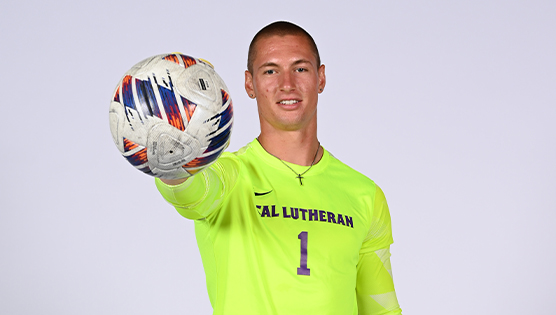
If a student wants to learn about more than just the cell and its structures, and truly understand the big picture, this major is the one for them. I have been able to learn more about the chemical processes that dictate our lives, and how important they are. Through my classroom experiences and research experience with Dr. Michael Abdelsayed, including his belief in me as a potential graduate student, I have developed a passion for going further into the life sciences.
Davis Sharts '23
Read their storyMany of our biochemistry majors are accepted into medical, dental, pharmaceutical and graduate schools. As part of a growing field, you will have many career possibilities. You could work on the frontiers of science in the heart of America’s biotechnology industry, practice medicine, participate in cutting-edge research, unlock the secrets of recombinant DNA or break new ground in genomics and proteomics.
Potential Careers
Medical and Clinical Laboratory Technologists
Perform complex medical laboratory tests for diagnosis, treatment, and prevention of disease. May train or supervise staff.
Read descriptionPhysicians, Pathologists
Diagnose diseases and conduct lab tests using organs, body tissues, and fluids. Includes medical examiners.
Read descriptionPharmacists
Dispense drugs prescribed by physicians and other health practitioners and provide information to patients about medications and their use. May advise physicians and other health practitioners on the selection, dosage, interactions, and side effects of medications.
Read descriptionChemists
Conduct qualitative and quantitative chemical analyses or experiments in laboratories for quality or process control or to develop new products or knowledge.
Read descriptionBiochemists and Biophysicists
Study the chemical composition or physical principles of living cells and organisms, their electrical and mechanical energy, and related phenomena. May conduct research to further understanding of the complex chemical combinations and reactions involved in metabolism, reproduction, growth, and heredity. May determine the effects of foods, drugs, serums, hormones, and other substances on tissues and vital processes of living organisms.
Read descriptionMicrobiologists
Investigate the growth, structure, development, and other characteristics of microscopic organisms, such as bacteria, algae, or fungi. Includes medical microbiologists who study the relationship between organisms and disease or the effects of antibiotics on microorganisms.
Read descriptionMolecular and Cellular Biologists
Research and study cellular molecules and organelles to understand cell function and organization.
Read descriptionGeneticists
Research and study the inheritance of traits at the molecular, organism or population level. May evaluate or treat patients with genetic disorders.
Read descriptionEmployers
Some of the organizations our graduates work for include:
- Amgen
- Baxter Bio Science
- BioSource International
- Dako
- Hirauo Optometric
- Integrity Bio
- Invitrogen
- Pfizer
- The Scripps Research Institute
- Thermo Fisher Scientific
Graduate Schools
Our alumni have pursued advanced degrees at:
- California Institute of Technology
- Colorado State University
- Harvard University
- Keck Graduate Institute
- Loyola University of Chicago School of Medicine
- Scripps Research Institute
- University of California, Berkeley
- University of California, Los Angeles
- University of California, San Diego
- University of California, San Francisco
- University of Nevada School of Medicine
- University of Southern California

The courses in my program provided me with foundational knowledge and the labs gave me practical, hands-on experience to apply that knowledge from the classroom. Cal Lutheran made me more confident in my abilities as a scientist.
Kirsten Rock '20
PhD student at the Centre for Pharmaceutical Medicine Research, King’s College London
This page includes information from O*NET OnLine by the U.S. Department of Labor, Employment and Training Administration (USDOL/ETA). Used under the CC BY 4.0 license. Some occupations listed above may require a related graduate degree.
How We Prepare You for Success
We have 20,000+ employer contacts for jobs and internships, with over 200 listings posted each week.
Our excellent career counselors in the Career Services center will get in touch with you during your very first term on campus. They offer over 50 workshops each year on resume writing, interviewing, salary negotiations, applying to graduate schools, and other critical skills to help you begin your career successfully.
After you graduate from Cal Lutheran, you receive free access to Career Services for life, as a valued member of our alumni family.
of Cal Lutheran graduates find a job or enroll in graduate school within nine months
We work with students and families to make sure everyone who is admitted to Cal Lutheran can afford it.
Tuition & Fees
You and your family might have questions about how you’ll cover the costs of college. We can tell you this — it costs less than you think.
Scholarships & Grants
We offer a range of awards based on academic merit and financial need. This is money that does not need to be repaid.
Net Price Calculator
Take a few minutes to use our calculator and get yourself a personalized estimate of your costs and financial aid.
Let us know and we'll send you information about our academics, campus life, the admission process, and more!
Ready to apply?
We’re now accepting applications for Fall 2026!
Level Up Your College Search
Check out our college success guides to help you navigate the search process.

How to Choose a College Major
Your major will be a significant part of your academic experience. How do you pick the right one?

5 Tips for Applying to College
Learn how to look good when applying to colleges, with personal tips to stand out from Cal Lutheran admission counselors.

How to Afford College
Read this guide to minimize costs as you save for college during high school — learn all about scholarships, financial aid, FAFSA, and more!

5 Key Advantages of a Liberal Arts Education
Are the liberal arts still worth studying in today's world? If you want a future-proof college education — absolutely.

How to Get Recruited for College Athletics
Check out our tips to connect with coaches, navigate campus visits, and move forward with confidence.

Private vs. Public Universities
The differences between each — and how to choose the school with your dream college experience.
